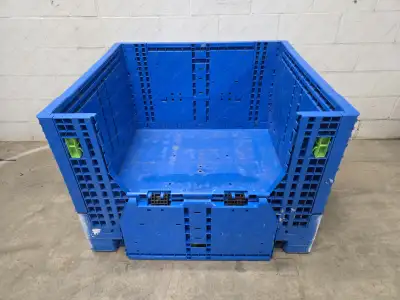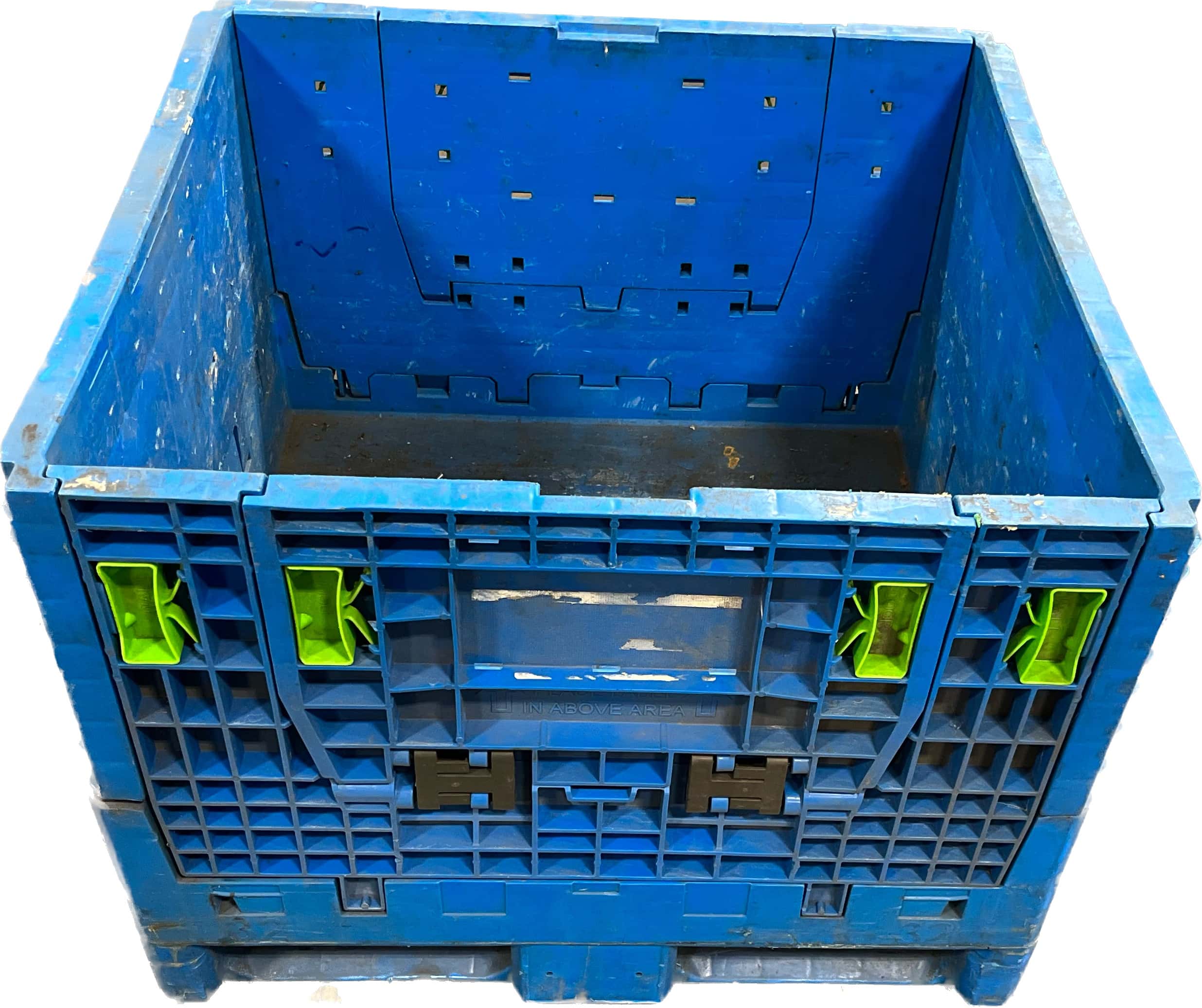The Ultimate Guide to Selecting the Right Bulk Containers for Your Business Needs
Picking the ideal bulk containers is critical for any kind of company that counts on effective logistics. Numerous sorts of containers exist, each developed for certain materials and applications. Elements such as size, material compatibility, and regulatory standards play a considerable role in this decision-making process. Recognizing these aspects can cause enhanced functional effectiveness. Many businesses ignore important facets that could enhance their total performance and sustainability. What are these considerations?
Comprehending Various Sorts Of Bulk Containers
Bulk containers function as essential devices for companies seeking reliable storage and transport remedies. These containers come in numerous kinds, each developed to fulfill specific operational needs. One typical type is the intermediate mass container (IBC), which is perfect for granulated and fluid materials, providing an equilibrium of ability and maneuverability. An additional preferred alternative is the bulk bag, or FIBC, ideal for completely dry, flowable products. These flexible containers are lightweight and can be easily transferred and stored. For larger products, inflexible bulk containers are commonly employed, giving toughness and security for safe handling. Furthermore, there are customized containers tailored for hazardous products, making certain compliance with safety and security policies. Understanding the distinctive qualities of these mass container types permits companies to make educated decisions that maximize logistics and minimize expenses. By picking the best container, companies can enhance their functional efficiency and improve their supply chain processes.
Trick Product Considerations for Mass Containers
When selecting bulk containers, it is important to contemplate the products made use of in their building and construction. Elements such as longevity, chemical, and toughness compatibility play a crucial role in making certain the containers meet particular operational demands. Furthermore, weight and portability issues can affect both performance and transport logistics.
Material Durability and Toughness
Toughness and stamina are important aspects in selecting products for mass containers, as they directly affect the container's capability to endure numerous environmental conditions and managing procedures. Products such as high-density polyethylene (HDPE), polypropylene, and stainless-steel are generally favored for their durable properties, offering resistance to abrasion, effect, and temperature fluctuations. The choice of product likewise affects the total lifespan of the container; more powerful products commonly result in much less constant replacements, bring about cost savings gradually. Furthermore, the weight of the material can influence shipping prices and ease of handling. Companies must consider their details operational environments and the capacity for damage to guarantee peak resilience and stamina in their mass container selection.
Chemical Compatibility Aspects
Recognizing chemical compatibility is necessary for choosing mass containers, as the materials utilized should resist the particular substances they will hold. Various aspects influence compatibility, including the chemical nature of the components, temperature level, and duration of storage. Corrosive chemicals might require containers made from stainless steel or specialized plastics that stand up to deterioration. Additionally, responsive materials can create warm or gases, requiring aired vent or pressure-rated containers. The choice of container material, whether polyethylene, polycarbonate, or metal, need to line up with the chemical residential or commercial properties of the stored substances to protect against violations or leakages. Ultimately, a comprehensive assessment of these compatibility aspects guarantees secure handling and storage space, protecting both employees and the setting while maintaining product integrity.
Weight and Transportability Issues
Selecting bulk containers includes not only assessing chemical compatibility however additionally thinking about weight and transportability. Services must evaluate the convenience of handling and transportation to maximize effectiveness. Lightweight materials like high-density polyethylene (HDPE) or aluminum can help with less complicated movement and decrease shipping prices. Alternatively, larger containers might give improved resilience but can impede wheelchair, particularly in settings calling for frequent relocation. Additionally, the design of the container should permit practical lifting and piling, making sure ergonomic safety and security for workers. Companies ought to likewise take into consideration the framework readily available for transport; for instance, containers compatible with forklifts or pallet jacks can streamline operations. Ultimately, the appropriate balance in between weight and transportability straight influences operational performance and cost efficiency.
Sizing Your Mass Containers for Optimum Efficiency
When sizing bulk containers, businesses need to carefully assess the dimensions required to suit their certain items. Furthermore, weight capacity is a critical variable that affects performance and security throughout transportation and storage space. Reliable sizing not just makes the most of area however additionally optimizes functional operations.
Establishing Container Capacities
Choosing the appropriate dimensions for bulk containers is crucial for optimizing efficiency in storage and transport. Services need to evaluate their specific needs, taking into consideration elements such as offered room, the nature of the products being stored, and the methods of transportation made use of. Precise dimensions ensure that containers fit preferably in storehouses and lorries, minimizing thrown away room and decreasing managing time. Standard dimensions can use comfort, yet custom dimensions could be needed for one-of-a-kind demands or to fit certain items. In addition, it is important to review piling capacities and availability, as these factors influence overall functional effectiveness. Eventually, the ideal measurements lead to boosted company and structured logistics, profiting the total productivity of business.
Weight Capability Considerations
Recognizing weight capability is crucial for companies aiming to optimize their bulk container efficiency. The weight capability of a container straight influences storage space capacities, transportation logistics, and general operational costs. Picking containers with the proper weight limits ensures that businesses can safely store and move their products without risking damages or compliance issues. Overloading containers can lead to architectural failures, while underutilizing ability outcomes in squandered sources. When selecting containers, it is crucial for companies to examine their product weights and consider any regulatory requirements. In addition, factors such as the kind of product, planned usage, and ecological conditions ought to likewise influence weight capacity decisions. By reviewing these aspects, services can enhance efficiency and guarantee a streamlined supply chain.
Regulative Compliance and Safety And Security Requirements

Governing compliance and safety requirements play a vital role in the choice of mass containers for services. Organizations should ensure that their containers meet numerous regulations set by neighborhood, national, and international authorities. These requirements typically relate to product safety and security, architectural integrity, and read review proper labeling, which aid protect against mishaps and guarantee the secure transportation of items.
Additionally, adherence to industry-specific standards, such as those from the Food and Medicine Administration (FDA) or the Occupational Safety and Wellness read the article Administration (OSHA), is essential for companies managing dangerous products or foodstuff. Non-compliance can lead to fines, legal concerns, or damage to an organization's credibility.
Organizations need to likewise consider the container's compatibility with the products being kept or transferred to stay clear of contamination or chemical reactions (used collapsible bulk containers). To sum up, understanding and implementing governing compliance and safety and security requirements is necessary for the accountable and reliable use of mass containers
Sustainability Options for Eco-Friendly Bulk Containers

Companies are also exploring choices made from recycled products, which not just preserve resources however additionally sustain the recycling sector. Advancements in layout permit for lighter containers that need much less power to transport, further enhancing sustainability. By incorporating these green mass container options, services can show their dedication to environmental stewardship while satisfying customer demand for lasting techniques. This change not only aids the planet however can likewise enhance brand credibility and consumer commitment.
Cost-Effectiveness and Budgeting for Bulk Containers
While several businesses concentrate on sustainability, cost-effectiveness remains a critical variable when choosing bulk containers. Organizations needs to examine the first acquisition rate, as well as long-lasting operational prices, to assure economic stability. Factors such as upkeep, reusability, and resilience play a considerable role in establishing general expenditures.
Investing in high-grade containers may produce higher upfront expenses however can lead to savings through minimized substitute rates and lowered waste. Additionally, businesses need to consider transport prices and storage space effectiveness, as these can affect the total spending plan.

Often Asked Questions
Exactly how Do I Identify the Right Container for Hazardous Materials?
To determine the right container for dangerous products, one must review compatibility with the compound, take into consideration the container's product, look for regulatory conformity, and examine capability and safety and security features to guarantee proper handling and storage.
Can Mass Containers Be Custom-made for Particular Products?
Yes, bulk containers can be customized for certain Extra resources items. used plastic containers. Numerous attributes, such as product, dimension, and layout, can be customized to fulfill distinct requirements, making sure perfect security and performance for delivering and keeping various items
What Is the Ordinary Life-span of Various Mass Container Types?
The ordinary life expectancy of mass container types varies; plastic containers last 5-10 years, metal containers 10-20 years, and wood containers typically last 3-7 years, depending upon usage, upkeep, and ecological problems.
Exactly how Should I Tidy and Maintain Mass Containers?
To cleanse and maintain bulk containers, one must on a regular basis evaluate for damage, eliminate deposit, clean with suitable detergents, wash completely, and guarantee proper drying out prior to storage. Adhering to maker standards boosts longevity and safety throughout use.
Exist Rental Choices for Bulk Containers Available?
Yes, various companies use rental options for mass containers, offering flexibility for organizations. These leasings can suit various demands, permitting business to manage supply successfully without the dedication of buying containers outright.
Toughness and strength are crucial aspects in selecting products for mass containers, as they straight influence the container's capability to stand up to numerous environmental problems and managing procedures. Recognizing chemical compatibility is important for picking bulk containers, as the products used have to resist the details compounds they will certainly hold. Understanding weight capacity is crucial for companies aiming to optimize their bulk container effectiveness. Governing compliance and safety and security criteria play an essential duty in the choice of mass containers for businesses. While many services concentrate on sustainability, cost-effectiveness continues to be an important aspect when selecting mass containers.